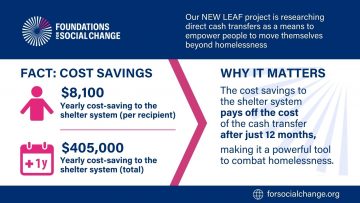There are major benefits to giving money directly to individuals experiencing homelessness, shows a study by the charity Foundations for Social Change and Jiaying Zhao, professor at IRES and UBC Psychology.

Their findings counter many of the assumptions people have about homelessness and are being shared by prominent media outlets, politicians, and public figures, hopefully leading to greater humanitarian impacts.
From the get-go, Zhao and Foundations for Social Change CEO Claire Williams believed that humanitarian efforts can benefit from scientific principles. While other people were quick to ridicule the idea of cash transfers to individuals experiencing homelessness, Zhao and Williams stuck to an evidence-based approach.
“At the end of the day, this collaboration is a scientific endeavor,” said Zhao. “I was willing to accept whatever results that came out. That’s science, and you find out whether this approach works or not.”
What the study found is striking. Results show that providing a cash transfer of $7,500 to each of the 50 individuals experiencing homelessness in B.C.’s Lower Mainland allowed the recipients to move into stable housing more quickly. They retained over $1,000 more in savings over one year, spent less money on temptation goods such as alcohol and drugs, and achieved food security sooner than a control group who did not receive the cash transfer.
Importantly, the study offers the first causal evidence on the power of direct cash transfers on homelessness reduction. From a cost-benefit analysis, the $7,500 cash transfer led to a total savings of $8,172 per person per year from reduced reliance on the shelter system, resulting in a net savings of $672 per person per year. This demonstrates that the direct cash transfer approach is more cost-effective than the status quo and can save the government and taxpayers a lot of money.

This pilot project was made possible by a grant from the federal government as well as many private donors and foundations. In addition to the financial support, Zhao expressed gratitude toward UBC’s Behavioural Research Ethics Board that initially raised many questions regarding participant safety and potential risks of harm. “I understand where the Ethics Board members are coming from and am grateful for their support over the last few years,” said Zhao. “Getting approval from BREB was definitely not easy. They raised the most difficult questions but it was a good exercise for us because now we can deal with any skeptics.”
The paper will be going through peer review – another challenge that Zhao is ready to face along with the work of expanding the study. “I would invite people to join our expansion project if they are interested,” she said. “Please send us comments and feedback that can help guide our next expansion project. I would absolutely welcome that.”
Foundations for Social Change hopes to expand their project to other cities in Canada including Toronto, Montreal, Ottawa and Halifax. Since homelessness is not a homogenous problem, the team is again adopting the stance they started with. Science – including a rigorous study design, implementation, and data collection – will lead the way.